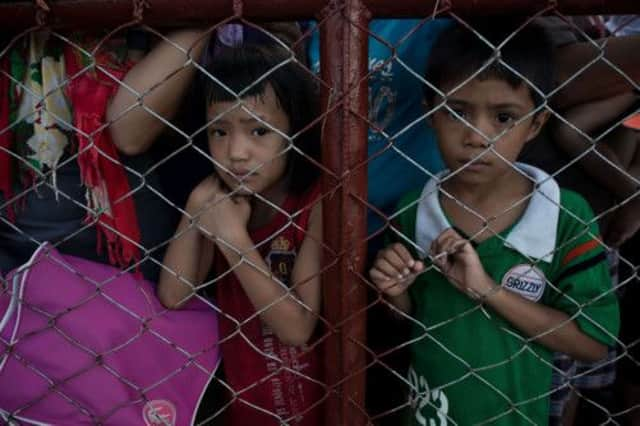Norman McKinley: Scots can help the Philippines


THE horrific scenes of utter devastation in the Philippines have shocked the world.
But the most heart-rending images are those that focus on the desperation in the faces of entire families struggling to survive without food, clean water or shelter.
Advertisement
Hide AdAdvertisement
Hide AdTyphoon Haiyan did not just destroy homes and livelihoods – it mercilessly swept away the most basic necessities of life. All that is left to the stricken population is hope. Hope that the rest of the world – someone, anyone – will come to their aid.
There is, as yet, no accurate tally of the number of people who lost their lives in what has been described as the most ferocious storm ever to make landfall.
It may sound hard, but defining a precise death toll is not a priority. That can be calculated later. Whatever the final figure, we already know it is too many.
What we do know is that right now more than nine million people who survived the storm lost absolutely everything and are fighting for their very existence. They are our sole priority.
Aid is now pouring into the Philippines to ease the suffering, but be under no illusions – this is just the start of a massive operation of an almost unimaginable scale.
An army of journalists, television crews and photographers from around the world is now in the Philippines. Their horrifying pictures of destruction; their words describing to an uncomprehending outside world the heartbreaking struggle for life; their interviews with people who have not eaten nor drunk fresh water for days – must shock each and every one of us.
The media’s role is to inform, to reveal what is going on in the world and to hold those in authority to account.
Already, against backdrops of destruction and desperation, reporters are asking: “Where is the aid? Why is it not here? What are the aid agencies doing?” The answer is simple – some of it is already there. More is on its way. And there are teams from international agencies working around the clock in the Philippines and other countries to get that aid to where it is needed most as quickly as possible.
Advertisement
Hide AdAdvertisement
Hide AdThere is no humanitarian magic wand that we can wave to make everything better overnight. I truly wish there was.
Delivering aid in the wake of any natural disaster anywhere in the world is always challenging. In the Philippines, that challenge is absolutely enormous for a number of reasons.
Even under normal conditions, parts of the Philippine Archipelago – made up of more than 7,000 islands, 2,000 of which are inhabited – are difficult to reach.
The scale of destruction left by Typhoon Haiyan is immense. Photographs and film can only convey a partial impression. Roads have been wiped out. Runways have been torn up or buried under thousands of tons of debris.
Communications in outlying areas are poor at best and vast areas are without power.
Getting huge shipments of aid to where they are needed is indescribably difficult. But we will do it.
International aid agencies such as my own, the Red Cross; Oxfam; Christian Aid; Save The Children; Concern and many more are among the most experienced in the world when it comes to dealing with the terrifying aftermath of natural disasters.
We all have our own particular skills and specialities and we know how and when to use them to the greatest effect.
Advertisement
Hide AdAdvertisement
Hide AdWe know exactly what is needed in the Philippines right now – food, water and shelter. Shipments of food and water purification equipment have arrived and more is coming. I know that as I write a planeload of inflatable shelters, each one capable of housing a family, has just arrived in the country, having made its way from a British Red Cross warehouse to the Philippines.
The aid effort is being helped by the militaries of various countries, who are bringing supplies, equipment and manpower to help clear routes to get the aid convoys through.
It is important to be aware that the aid effort began as soon as the storm struck. Staff and volunteers from the Philippine Red Cross have been working tirelessly and without rest to do everything they can to ease the suffering of their people.
Even with all of these resources, it is still an immense challenge requiring skill, dedication and determination – assets the humanitarian agencies and everyone else trying to help have in plenty.
I’ve seen some of the logistical reports sent back from our workers on the ground describing the breathtaking magnitude and difficulty of their task. That is why we need the help of the people of Scotland. That is why the Disasters Emergency Committee launched an appeal on Tuesday.
We live in tough economic times and it seems that there is always someone asking us to give money. On this occasion, I make no apologies for being that person.
I don’t need to tell you how bad the situation is in the Philippines. you can see that for yourselves on any news bulletin. I know you find the scenes as heart-rending and as difficult to watch as I do.
The people of Scotland can help. You can play a part in this hugely difficult aid operation.
Advertisement
Hide AdAdvertisement
Hide Ad• Norman McKinley is chairman of the Disasters Emergency Committee Philippines Typhoon Appeal in Scotland and director of the British Red Cross in Scotland, Wales, Northern Ireland and the Isle of Man. To make a donation to the DEC Philippines Typhoon Appeal visit http://www.dec.org.uk, call 0370 60 60 900, or donate over the counter at any high street bank or post office.